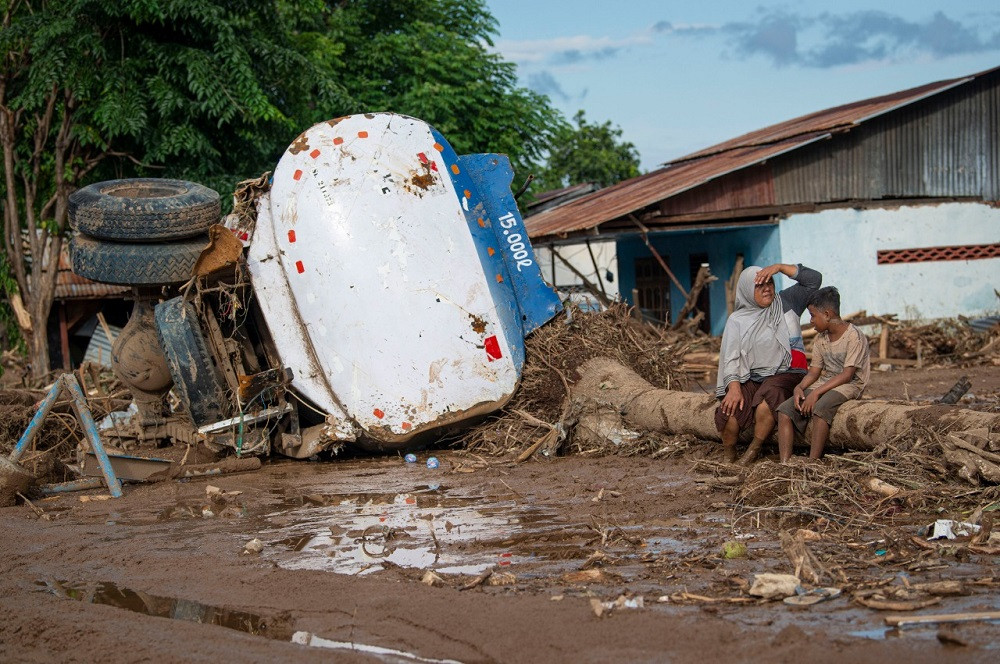Popular Reads
Top Results
Can't find what you're looking for?
View all search resultsPopular Reads
Top Results
Can't find what you're looking for?
View all search resultsQuo vadis counterterrorism in Poso and the country?
Every deployment of troops is responded to with acts of terror, and no security system can guarantee the right to life of civilians.
Change text size
Gift Premium Articles
to Anyone
T
he East Indonesia Mujahidin (MIT) terrorist group struck again in Central Sulawesi’s Poso regency, leaving four dead, nearing the end of Ramadan earlier this month. The group killed four villagers, including a man whom they beheaded in front of his wife.
The weekend killing was seen as a retaliation to the police’s crackdown on the group, which left two MIT members dead, earlier this year.
The recent attack in Central Sulawesi came nearly two months after a newlywed couple detonated a bomb at the gate of the Makassar cathedral and a young woman attacked the National Police headquarters in Jakarta.
Terrorists always target civilians, as well as the state symbols they presume as thogut (those who worship anything except Allah), to create fear as has repeatedly happened in Central Sulawesi and elsewhere. Escalation of troop deployment is a predictable response. Since April 2021, more reinforcement troops have been sent to the province under Operation Mandago Raya.
In 2016, then-National Police chief Gen. Tito Karnavian said that apart from chasing the terrorist group members, the law enforcers approached local communities that sympathized with the Santoso-led MIT. At that time, Tito was confident the police troops were quite capable and familiar enough with the jungles where the MIT was operating.
However, from 2018 to 2020, the series of violence against civilians continued, characterized by attacks on remote villages and beheading of the victims. The security authorities finally admitted that the operation did not succeed due to the difficult geographical challenges: Mountains and forests typify the operational areas of Poso, Sigi and Parigi Moutong.
The police’s hunt for the MIT, which is currently led by Ali Kalora, has involved unmanned aircraft technology that can detect human body temperature, but the rugged terrain has caused the chase to last for years. The group reportedly is only armed with a long-barrel firearm and two short-barrel firearms, as well as homemade bombs.
In August 2020, the MIT killed a man in his garden in Sangginora village, Poso Pesisir Selatan subdistrict. Three months later the terrorist group attacked Lemban Tongoa village in the neighboring regency of Sigi and burned the Salvation Army service post there. The terror in Sigi is thought to be an attempt by the group to warn local communities against serving as “spies” for the security authorities.
The manhunt for the MIT members involved around 700 police and military personnel under Operation Tinombala. The operation was extended and renamed Mandago Raya this year.
Countering acts of terrorism in Poso through the deployment of a large number of troops, even though it is stipulated in the 2018 Counterterrorism Law, however, must pay attention to its implications, as it will directly or indirectly affect civilians there.
Amid the relentless, intensifying hunt, we wonder if the local people can live in peace, and how. The vicious circle of violence materializes as every deployment of troops is responded to with acts of terror, and no security system can guarantee the right to life of civilians.
Terrorism, regardless of its scale, causes loss of property and lives. Since March 2020, terrorist attacks in Indonesia - and around the world – have shown no signs of subsiding. Globally, there is a tendency for terrorist groups to use the COVID-19 pandemic as an opportunity to reconsolidate and maintain militancy and ensure their actions continue.
The authorities have repeatedly stated that counterterrorism measures aim to address acts of terrorism. However, they do not seem to take into account the fear and tension that grip the local population as a result of the operations, which oftentimes create a war-like situation.
On the other hand, it cannot be denied there is a tendency within certain groups or communities to glorify suspected terrorists who die at the hands of the authorities, as shown in social media.
How can the government and communities work together in countering terrorism? The message of Central Sulawesi Governor Longki Djanggola in 2018 may reflect the wishes of a civilized nation like Indonesia. Longki called for more interfaith dialogues, peaceful settlement of all social conflicts, an early warning system to prevent conflicts and post-conflict rehabilitation.
Distribution of staple food packages for people of Poso and Parimo in early 2021 was a right step to win the hearts and minds of local communities, but such an activity will not have a long-lasting impact.
A comprehensive strategy to counter terrorism, as stipulated in the new national plan of action on countering violent extremism that leads to terrorism under Presidential Decree No. 7/2021 (NAP C/PVE) must be activated nationwide.
It is high time that a sense of collectivism to address violent extremism that leads to terrorism be put in place. In doing so, an organized and systematic leadership is needed to ground and sound an action plan to prevent violent extremism. Civil society groups already provided input for formulation of the action plan three years ago.
Although the National Counterterrorism Agency (BNPT) does not have arms in regions, a network of local people who are familiar with the prevention of violent extremism can be a significant part of the program-based implementation.
Apart from the NAP C/PVE, local initiatives deserve strong recognition from the government, as well as security authorities. Without acknowledgement, it would be difficult to win trust and support from local people in the fight against terrorist groups such as the MIT.
***
The writer is PhD candidate at Monash Gender, Peace and Security Centre, Monash University, Australia.










